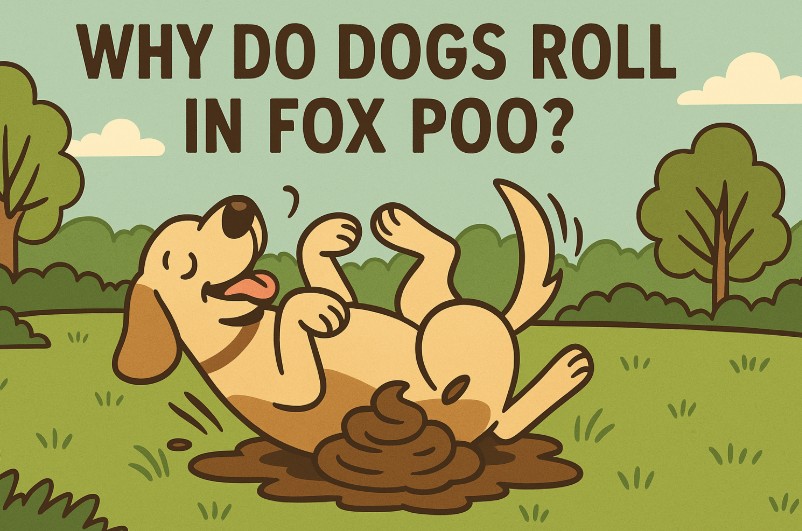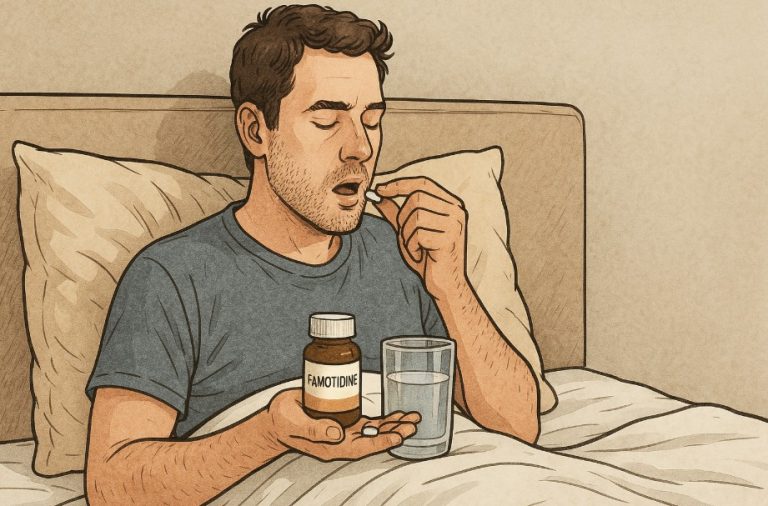Why Do Dogs Roll in Fox Poo? | Common Reasons!
Did you know that most of the dog owners in the UK have caught their canine companions rolling gleefully in something unspeakably foul, often fox faeces? As unpleasant as it may be for humans, for dogs, this smelly ritual is deeply ingrained in their natural instincts. The question remains: why do dogs roll in fox poo?
While it might seem like a rebellious act or an unfortunate quirk, there’s actually a fascinating mix of evolutionary behaviour, communication instincts, and sensory exploration at play.
In this detailed guide, we’ll uncover the most common reasons behind this habit, its potential health implications, and practical steps UK pet owners can take to prevent it.
Why Do Dogs Roll in Smelly Things Like Fox Poo?
Dogs are naturally drawn to strong and unusual smells, and fox poo happens to be one of the most pungent they can find. While it may disgust humans, it’s completely natural behaviour for dogs deeply rooted in their instincts and driven by complex behavioural triggers.
Let’s take a closer look at the common reasons why dogs engage in this behaviour.
Common Reasons Dogs Roll in Fox Poo
1. Instinctive Scent Masking
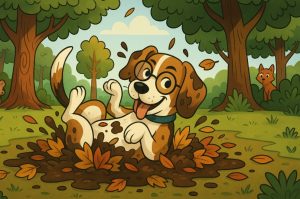
One of the most widely accepted theories is that dogs roll in strong-smelling substances like fox faeces to mask their own scent.
This behaviour harks back to their wild ancestors, such as wolves, who would disguise their scent to sneak up on prey without being detected. Though domesticated dogs no longer need to hunt, this primal instinct remains.
2. Territorial or Pack Communication

Dogs may roll in strong odours as a way of “collecting” information to bring back to their pack—whether that’s a group of dogs or their human family.
The idea is that a dog who returns home covered in a new scent can communicate environmental details to others in their group. In the wild, this might be useful for scouting new territory or tracking prey.
3. Attention-Seeking or Learned Behaviour
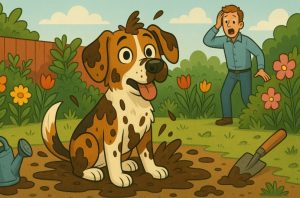
In some cases, dogs repeat the behaviour because they’ve learned it gets a reaction. If owners consistently react strongly—either by shouting or rushing to clean them, the dog may associate rolling in poo with attention, even if it’s negative. Over time, this response may reinforce the habit.
4. Sensory Enjoyment

Dogs live in a world dominated by scent. What seems foul to us may actually be rich and exciting to them. Rolling in something like fox poo provides sensory stimulation, engaging their brains in the same way humans enjoy new sights or sounds.
5. Marking Themselves with Environmental Scents
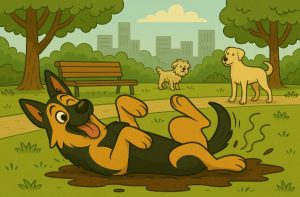
Dogs may roll in faeces to carry the scent on themselves almost like a natural badge that tells other animals, “I’ve been here” or “I found this.” It can be a way of mingling their own scent with a new one, perhaps to leave a more complex scent trail behind.
6. Disguising Their Scent from Predators or Prey
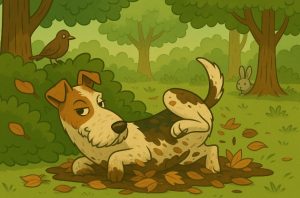
Some experts suggest that dogs, like their ancestors, may roll in pungent smells to throw off potential predators or rivals. By blending into their surroundings with natural smells like fox poo, they become less detectable in the wild.
Is Rolling in Fox Poo Normal Behaviour for Dogs?
Yes, it is normal, although definitely not ideal from a human perspective. In fact, rolling in pungent substances is a behaviour observed in many breeds and across all age groups.
Instinctual Behaviour in Domestic Dogs
Even the most well-behaved and pampered dog may suddenly dive into a patch of fox poo during a walk. It can catch owners off guard, but it’s a completely instinct-driven act rather than a behavioural issue. That said, repetition and habit reinforcement can increase the frequency of the behaviour if not addressed.
The Role of Scent in a Dog’s World
Dogs perceive scent much more powerfully than humans do—estimated to be between 10,000 to 100,000 times more sensitive. For them, each smell tells a story. The scent of fox faeces could reveal what the fox has eaten, where it has been, and even its health status. Rolling in it is a way for the dog to quite literally immerse itself in that story.
Comparing Domesticated Dogs to Their Wild Ancestors
The behavioural gap between wolves and domestic dogs isn’t as wide as one might think. Although domesticated, many breeds retain high prey drives and sensory curiosity. Fox poo, being the calling card of another predator, taps into this primal response.
Can Rolling in Fox Faeces Be Harmful to Dogs?
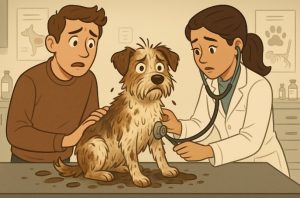
While the behaviour itself isn’t inherently dangerous, the substances involved can pose health risks to both pets and their humans.
Health Risks Associated with Rolling in Faeces
Fox faeces often harbour parasites, bacteria, and viruses. A simple roll in poo may not cause immediate issues, but if the dog licks its fur afterwards—or if the mess transfers to household surfaces—the risks multiply.
Potential Parasites and Bacteria
Among the most common health concerns are:
- Lungworm (Angiostrongylus vasorum): Can be contracted by ingesting infected faeces or slugs/snails that have come into contact with them.
- Giardia: A microscopic parasite causing gastrointestinal upset.
- Campylobacter and Salmonella: Bacteria that can infect both dogs and humans, leading to vomiting and diarrhoea.
- Toxocara canis: Roundworms found in fox faeces, which can also affect humans—particularly young children.
How It Affects Dog Hygiene and Skin?
Aside from the health concerns, rolling in fox poo leaves an unpleasant odour that can linger in the dog’s coat. It may also cause skin irritation or allergic reactions in sensitive dogs, especially if the faeces contain chemical residues or decaying material.
How Can You Stop Your Dog from Rolling in Poo?
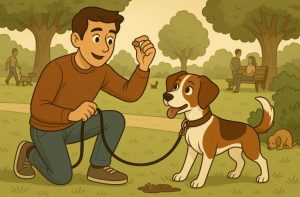
Addressing this issue requires a combination of training, awareness, and environmental control.
Effective Training Techniques
Teaching a reliable “leave it” or “come” command can be a game changer. These commands should be practised in distraction-free environments before being introduced during walks. Once mastered, they can be used to interrupt your dog before they dive into trouble.
Distraction Methods and Recall Training
Using high-value treats, toys, or praise can be effective in redirecting attention. Positive reinforcement builds trust and encourages your dog to stay focused on you, even in the presence of tempting scents.
Use of Dog Repellent Sprays and Protective Gear
While not a universal solution, dog-safe repellent sprays can be applied to areas your dog frequently rolls in. Additionally, dog coats or vests can provide a physical barrier between the fur and the faeces.
What Should You Do If Your Dog Rolls in Fox Poo?
No matter how careful you are, accidents happen. The key is knowing how to clean your dog effectively and safely.
Best Products to Eliminate Odour
Not all shampoos are created equal. Standard dog shampoo might remove visible dirt, but often the smell lingers. Look for products that contain enzymes designed to break down organic material and neutralise odours.
Home Remedies for Cleaning Fox Faeces from Fur?
If you’re caught without a commercial cleaner, a homemade mix can help:
- A gentle white vinegar and baking soda paste can lift and neutralise odours.
- Wash the area with lukewarm water, apply a small amount of the paste, let it sit briefly, then rinse thoroughly.
Tips for Preventing Repeated Behaviour
Prevention often starts with awareness. If you walk your dog in areas known for fox activity (wooded trails, rural fields), keep them on a lead in high-risk zones. Observing your dog’s body language can also help—intense sniffing or fixated staring may be the prelude to a roll.
What Do Vets Say About Dogs Rolling in Poo?

Veterinary professionals generally agree that while the behaviour is instinctual, it should be monitored to prevent health complications.
What Professionals Say About This Habit?
According to The Kennel Club and various UK vets, rolling in faeces is not usually a sign of a deeper medical issue. However, it’s something to address early to avoid it becoming habitual.
When to Be Concerned?
If your dog shows signs of illness after rolling—such as diarrhoea, lethargy, vomiting, or itching—it’s best to book a veterinary appointment. These could be signs of an underlying infection or allergic reaction.
Behavioural Therapy or Intervention?
In more extreme cases where training has failed, a qualified animal behaviourist may be able to help. They’ll work with both you and your dog to create a structured training plan that discourages the unwanted behaviour.
What Should UK Dog Owners Know About This Behaviour?
This behaviour is especially common in rural and suburban areas where fox populations are more prevalent. As a UK dog owner, it’s useful to know the seasonal habits of foxes, as their presence and marking behaviour increase during mating and breeding seasons.
It’s also worth knowing that foxes tend to use the same spots repeatedly, so avoiding certain paths or field edges can significantly reduce the chances of your dog encountering their droppings.
Conclusion
While it may seem like a nightmare for dog owners, rolling in fox poo is a natural, instinct-driven behaviour with deep evolutionary roots. It’s not your dog being naughty—it’s simply them being, well, a dog.
However, understanding the behaviour allows you to manage it. With consistent training, preventative measures, and the right cleaning techniques, you can significantly reduce how often this messy event occurs. For UK dog owners, awareness of local fox activity and a solid recall command go a long way.
So the next time your pup dives into something dreadful, take a deep breath—armed with knowledge and a bottle of dog shampoo, you’ve got this.
FAQs About Dogs Rolling in Fox Poo
Can fox poo make dogs sick?
Yes, fox faeces can carry bacteria and parasites that may lead to illness in dogs and humans.
Why does my dog specifically go for fox poo and not other animals?
Fox poo contains strong and musky compounds that are especially appealing to dogs’ senses.
Is rolling in poo more common in certain dog breeds?
Breeds with strong hunting or scent-tracking instincts, such as terriers and retrievers, are more likely to exhibit this behaviour.
How can I stop this behaviour permanently?
Through consistent positive reinforcement training, managing walking routes, and timely redirection, you can significantly reduce the chances of this behaviour continuing.
Does neutering affect this type of behaviour?
There’s little evidence to suggest that neutering impacts scent-rolling, as it is instinctual rather than hormonal.
Are there any natural sprays to deter this behaviour?
Some natural deterrents like citrus-based sprays or diluted vinegar can be effective in discouraging dogs from certain areas.
Should I consult a vet or behaviourist about this?
Yes, if the behaviour becomes obsessive or leads to recurring health issues, professional guidance is advised.

